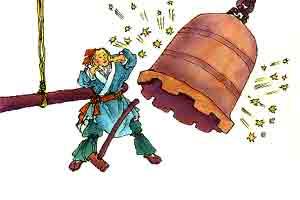| Chinese Idioms Learnning (3) | |
|---|---|
| Dec 4, 2007 00:39 | |
 | No.1 黔驴技穷 (Qian 2 Lv 2 Ji 4 Qiong 2) It means " The Guizhou Donkey has exhausted its tricks---at one's wit's end or at the end of one's rope." History: It is said that there was no donkey in Guizhou Province. One day, a merchant brought back a donkey from other province. However, he could do nothing with his donkey due to Guizhou's landform----mountains were everywhere so that he tied the donkey at the foot of the mountain and let it grazing green weeds. Some days later, a tiger went down from the mountain and was frightened by the donkey since he never saw a donkey before. The tiger was looking at the donkey for a whole day, hiding himself in the bushes. Finally, he concluded that the donkey was ordinary, not a cruel creature. On the second day, the tiger decided to make a close observation on the donkey. When the tiger was approaching him, the donkey heehawed loudly. The tiger was frightened and ran away immediately. Running for a while, he found that the donkey did not follow him so that he came back again. Gradually, the tiger got used to donkey's heehaw and got close to him. He teased the donkey using his claws. The donkey was very angry and kicked the tiger with his hind legs. But the tiger dodged away. The tiger felt quite happy and said to himself:" The donkey can't do any harm to him and only can kick others with his hind legs." Then he rushed at the donkey, bit him to death and enjoyed the donkey as his feast.  |
| Dec 4, 2007 01:00 | |
 | No.2 掩耳盗铃( Yan 3 Er 3 Dao 4 Ling 2). It refers to "plug one's ears while stealing a bell---deceive oneself or bury one's head in the sand." History: During the period of Spring and Autumn ((770 BC - 476 BC), an aristocrat named Zhi Bo perished Fan's family. A thief came into Fan's home and wanted to steal something. He saw that there was a huge bell at the court, which was made of good bronze and carved with beautiful patterns. Thus, he decided to take this bell to his home. However, the bell was too big and heavy and he could not move it. After a while, an idea came up on his mind----to break the bell into pieces and then take them back. The thief found a hammer and used it to break the bell. While hitting the bell, a deep soud was made and the thief was afraid that other people might hear the sound and came over here to seize him. Thus, he embraced the bell and wanted to stop the bell ringing. How could he stop it by his two arms? Scared by the sound, he pluged his ears with his hands. Then he found that the sound was weak. He felt very happy and said:"If I pluged my ears, the sound will be weak and I couldn't hear it." Thus, he found two cloth pieces to plug his ears. Then he continued to hit the bell with his hammer. People living around heard of the sound and came to Fan's family. Finally, the thief was caught.  |
| Dec 5, 2007 15:37 | |
 | This is an interesting series of threads Zoey! These idioms are quit tricky to grasp, and in answer to your previous request, it is difficult for me to suggest close equivalents in the english language. The first, although similar to 'being at the end of one's rope' is not quite the same IMO.. being at the end of one's tether (rope) is meant to refer to a tethered animal reaching the edge of its grazing (therefore the limit of its 'resources'), and does not fit the situation of the donkey very well, being not quite the same as 'tricks'. Closer may be the concept that the donkey was a 'one trick pony' (though it had its heehaw as well as its kick!). The second is very much the same as the Osterich that buries its head in the sand and thinks the threat has gone away! I'm not sure that Osterich birds are really that dumb, but the thief in the story clearly was! |
| Dec 5, 2007 19:38 | |
 | Thanks, Mike. I know that there are no similar equivalents for some Chinese idioms and some English idioms may have similar meanings with its Chinese equivalents. However, there are still some differences( Being at the end of one;s rope is a good example). With your help, I now understand the differences. |
Post a Reply to: Chinese Idioms Learnning (3)






 Copyright © 1998-2026 All rights reserved.
Copyright © 1998-2026 All rights reserved.